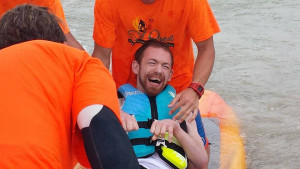A Lifelong Advocate Asks Families to Speak Up
Ginger Pottenger has been a member of The Arc – at either the local, state, or national level – since the early 1970s. She lives in Arizona, near her daughters, Kandi and Kristi.
How did you get involved in the disability advocacy movement?
I was an advocate before I knew it what that really meant. My daughter Kandi, who will soon turn 51, was diagnosed with “mental retardation,” as it was known then, when she was 3. The diagnosing doctor’s advice was to take her home and love her. And that’s what we did. We stumbled into inclusion. We were lucky to be in a community and at a pre-school that saw the value in her being included with kids without disabilities. When Kandi started grade school, someone asked me if we were involved in The Arc. So I went to my first meeting at my local chapter, and before long, I was serving on their board.
As a parent, what were some of the early struggles and triumphs you encountered?
I didn’t fully appreciate it then, but Kandi’s inclusion in pre-school was a triumph at that point in time. This was still the era of putting kids in institutions. But we had our ups and downs – I had to push hard to have Kandi walk at high school graduation. Then as a young adult, living a few towns away and working in the community, we had some serious issues with the staff.
You have been both a “professional advocate”, serving as an executive director of chapters of The Arc and on boards and other positions, and a parent to Kandi. How have those experiences shaped how you advocate?
I have seen the power of the personal, nitty gritty story, on public policy. People are too scared to get on the phone or get in front of their elected officials, and tell them the consequences of their policy decisions. Or people will think they don’t have time to advocate. And I understand raising a family, including a child with special needs, maintaining a career, a marriage, a life – it all takes time. But you’re in it for the long haul as a parent. Share your hopes and dreams for your family, the struggles, your fears.
What’s your biggest concern today for the future of Kandi and other people with I/DD?
What is going on at the federal level with funding and the structure of Medicaid scares me to death. And it should scare others into action. The threat to our funding is real and if we lose the supports that Kandi has, our options are bleak. Chapters of The Arc should be the place they go for training on how to advocate, for encouragement from chapter leaders and other families.
How do you suggest presenting your story?
I don’t sugarcoat it – I just met with my state senator recently, and I told her – I can’t die not knowing that the supports will be in place for Kandi. I’ve worked too hard for it to all go away when I’m not here. Right now, she’s in a good place, living in a townhome, with some supports, and has supported employment in the community. But what does the future hold for her if public policy decisions change the way the money flows?
I’ve been doing this for many years, and I still write out what I want to say, and I practice. I may only get 10 minutes with that important person, and I’m going to make an impact. I tell them about our lives and why these supports are so important. I want them to understand and remember that our lives are impacted by their policy decisions.
What else do you think makes an impact?
I’ve also dug into the dollar and cents of what Kandi receives, to demonstrate that the investment is going a long way to her independence. I contacted our Division of Developmental Disabilities office in Arizona to get the dollars for Kandi’s supports. I had them break it down between federal and state dollars and type of support. Kandi has support in her house and supported employment supports at work. I then took those numbers down to what the state and feds pay a day so Kandi can have a real life in the community. I compared the cost to more restrictive settings and it is so much less money!
What do you do to develop a relationship with your elected officials?
It begins by visiting with them. I take notes about my interactions with public officials. Thank them for what they’ve done right. The disability community is thrilled with the passage of the ABLE Act. And it was the most bipartisan thing Washington has done in a long time! You have allies where you least expect it.
Any final thoughts to share?
Families can’t wait for the crisis to think about the future. It blows my mind how many people with disabilities the same age range as Kandi, whose families haven’t considered what’s going to happen when they die. The Arc’s Center on Future Planning is going to be a great resource to them, and so will their local and state chapters of The Arc. These families need to face reality – so much has changed for people with I/DD in society. We can’t go backwards, and they’ve got to step up.










